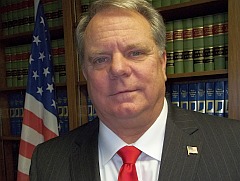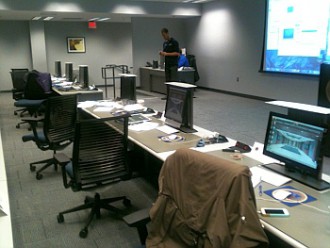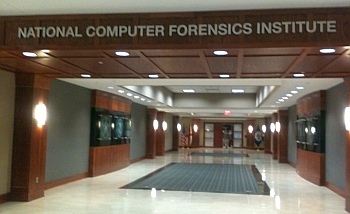February 8, 2015

Prosecuting Attorney Nelson Chipman was recently selected by the United States Secret Service and United States Homeland Security to attend the National Computer Forensics Institute in Hoover, Alabama. Chipman was one of twenty-four prosecutors and district attorneys from around the country to undergo the intensive one-week instruction in computer based crimes and evidence extraction, preservation and courtroom presentation. The training took place the last week of January. All expenses related to the training, including air travel, housing and food were paid by the federal government.
The National Computer Forensics Institute (NCFI) is dedicated to the education of law enforcement professionals in the field of computer forensics and digital evidence handling techniques. Congress, in supporting extensive funding for the NCFI and its attendees, recognizes that today’s high-tech environment presents new challenges to law enforcement as cyber criminals exploit computers and the Internet to threaten our banking, financial and critical infrastructures, as well as personal identification information theft (identity theft) and the exploitation of children through child pornography. NCFI recognizes it is imperative to address the rapid changes in technology by providing training on cyber-investigative techniques to local law enforcement officers, prosecutors and judges.
 The classroom setting included a personal computer at each work station. The training began with an introduction to computer technology and the actual dismantling of a computer and its reassembling by each student. Legal considerations in obtaining digital evidence was next on the agenda, which included the details for the proper search and seizure of computers and related items. Forms of search warrants were studied and analyzed. In depth discussions were held on the statutory restrictions to obtaining information from Internet Service Providers and other third parties. Maintaining citizens’ privacy interest was of paramount concern.
The classroom setting included a personal computer at each work station. The training began with an introduction to computer technology and the actual dismantling of a computer and its reassembling by each student. Legal considerations in obtaining digital evidence was next on the agenda, which included the details for the proper search and seizure of computers and related items. Forms of search warrants were studied and analyzed. In depth discussions were held on the statutory restrictions to obtaining information from Internet Service Providers and other third parties. Maintaining citizens’ privacy interest was of paramount concern.
Several days were devoted to the forensic process of data acquisition and analysis. Instructors for the course included a Senior Assistant State’s Attorney from Stamford, Connecticut, a certified computer forensic examiner from the Dallas, Texas Sheriff’s Office and a Special Agent from the United States Secret Service high tech task force based in Los Angeles, California. The final two days at the institute were devoted to courtroom exercises aimed at introducing into evidence the results of forensic examinations and the cross examination of computer experts. Lastly, time was devoted to the jury selection process for digitally dominated cases.
 Chipman acknowledged first it was an honor to be selected to attend. “The public would be astounded to know the huge percentage of cases we in the Prosecutor’s Office see everyday in which digital evidence plays a major role. This could be something as increasingly common as security camera footage, not only from security systems for stores or homes, but also footage taken of events happening nearby and not on the premises intended to be filmed.” Chipman added, “ the use of cellular phones, and text messages or instant messages on mobile devices, are frequently present in drug cases and property offenses in which more than one perpetrator is at work.”
Chipman acknowledged first it was an honor to be selected to attend. “The public would be astounded to know the huge percentage of cases we in the Prosecutor’s Office see everyday in which digital evidence plays a major role. This could be something as increasingly common as security camera footage, not only from security systems for stores or homes, but also footage taken of events happening nearby and not on the premises intended to be filmed.” Chipman added, “ the use of cellular phones, and text messages or instant messages on mobile devices, are frequently present in drug cases and property offenses in which more than one perpetrator is at work.”
“I shared with the class how fortunate I considered myself in having been a deputy prosecutor some twenty-five years previous and how the digital recording or instigation of crime had not yet started. Returning to the prosecution of criminal cases three years ago was an astounding epiphany for me in how pervasively people communicate digitally with one another, 99 percent of the time innocently and with good intentions, and one percent of the time with bad intentions.” “Law enforcement is interested in capturing that one percent with the ultimate objective of preserving public safety,” Chipman added.